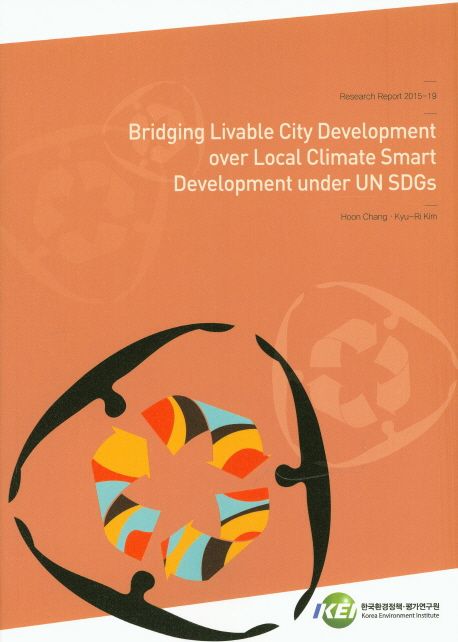
보고서KEI 연구보고서 2015-19UN 지속가능발전 목표하에 Climate Smart Development를 연계한 살기 좋은 도시 구현 및 확산 연구
Bridging Livable City Development over Local Climate Smart Development under UN SDGs
- 저자
- Hoon Chang | Kyu-Ri Kim
- 단체저자
- 한국환경정책·평가연구원
- 발행사항
- 세종 한국환경정책·평가연구원 2015
- 형태사항
- 123 p. 도표 그래프 25 cm
- 총서사항
- KEI 연구보고서 2015-19
- 서지주기
- 참고문헌(p.103-108) 수록
소장정보
| 위치 | 등록번호 | 청구기호 / 출력 | 상태 | 반납예정일 |
|---|---|---|---|---|
이용 가능 (1) | ||||
| 자료실 | P423916 | 대출가능 | - | |
이용 가능 (1)
- 등록번호
- P423916
- 상태/반납예정일
- 대출가능
- -
- 위치/청구기호(출력)
- 자료실
목차
Ⅰ. Introduction
1. Background and objective
2. Research scope and methodology
Ⅱ. Climate change & sustainable development environment under UN SDGs
1. From sustainable development to UN SDGs implication of sustainable development
1.1. Historical implication of sustainable development
1.2. Transition from MDGs to SDGs
2. Climate change in UN SDGs
2.1. UN’s reaction for disaster reduction
2.2. The three UN world conferences on disaster
2.3. Goals & indicators of SDGs for adaptation of climate change
3. Sustainable settlement environment and urbanization in UN SDGs
3.1. Why sustainable city matters?
3.2. Urbanization in SDGs
Ⅲ. Livable city, resilient city and climate smart planning
1. Livable city as sustainable city
1.1. Definition of livable city
1.2. Components of livable city
2. Resilient city as sustainable city
2.1. Historical development of the resilience
2.2. Defining the resilient city
3. Climate smart planning for sustainable city
3.1. What is the climate smart planning?
3.2. Planning process of climate smart planning
4. Concluding remarks
4.1. Comparison analysis of three types of city
4.2. Adaptation of climate change and sustainable settlement under UN SDGs
Ⅳ. Case study and implication
1. Korea
1.1. The problems facing Korea about sustainable development
1.2. Climate smart planning and resilient city
1.3. National and local government’s actions
1.4. Policy implication
2. Japan
2.1. Two challenges in terms of social resilience and sustainable city in Japan
2.2. Resilient city for sustainable development of Japan
2.3. Initiative for livable and resilient city
2.4. Case of livable and resilient city
2.5. Implication
3. Germany
3.1. Germany at its way to climate change adaptation
3.2. Case of adaptation strategy in Germany: Dresden in Free State of Saxony
3.3. In the Dresden region and elsewhere
4. Comparison analysis among cases
4.1. Common aspects
4.2. Different aspects
4.3. Policy Implications & Critics
Ⅴ. Conclusion
1. Major findings
2. Future direction
Reference
Appendix
Abstract in Korean
